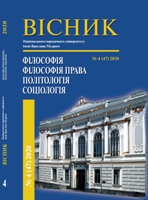ФАКТОР ВОЄННОЇ СИЛИ В СУЧАСНИХ МІЖНАРОДНИХ ВІДНОСИНАХ
FACTOR OF MILITARY POWER IN MODERN INTERNATIONAL RELATIONS
Author(s): Oleksandr Yurievich Panfilov, Lyudmila PetrovaSubject(s): International relations/trade, Military policy
Published by: Національний юридичний університет імені Ярослава Мудрого
Keywords: international relations; military force; military power; armed conflict; use of military power;
Summary/Abstract: Problem setting. The modern world continues to consider military power as one of the most important tools for solving foreign policy problems. However, it is not an extraordinary option or a last resort in the range of possible shares. Military power has become a widely used tool along with political and diplomatic actions. The decision to use military power is made by world actors based on their own understanding of their national interests and the appropriateness of its use, even without a UN resolution. Thus, the issue of the study of military power as a tool in international relations becomes relevant.Recent research and publications analysis. Consideration of certain issues of military strength aspects is reflected in the works of R. Aron, O. Bodruk, A. Gramsci, R. Keohein, Н. Morgenthau, J. Nye, V. Smolyanyuk, Р. Taylor, A. Toffler, M. Trebin, K. Waltz, I. Wallerstein, S. Huntington and others. However, in modern conditions, the issue of the use of military power in international relations requires a new rethinking, especially in the context of systemic changes in world society.Paper objective. The purpose of this article is to analyze some aspects of the use of military power in international relations.Paper main body. The article reveals some aspects of the use of military power in international relations. The essence of the military power of the state, the forms and tasks of its use are revealed. The article examines some aspects of the use of military power in international relations. The essence of the military power of the state, forms and tasks of its application are revealed. It is highlighted that the simplest scenario of the state's transition to military actions and in the international arena is the threat of the use of force demonstrated by it (explicit - hidden, real - conditional); A more complex type of use of military power remains armed violence - direct physical influence on the opposite side by means of armed struggle for the purpose of its destruction or profitable transformation and, accordingly - to achieve their own political goals. Among the tasks of military power in international relations are: the task of demonstrating daily state military capabilities in order to deter a potential adversary from direct aggression or hostile actions of a lower level (passive deterrence); the task of demonstrating excessive military power and determination to use it in the event of partial involvement of the country's mobilization capabilities to ensure counteraction to a potential adversary (active deterrence); the task of demonstrating excessive military superiority and readiness to use force in order to force a potential adversary to retreat from controversial issues or to act contrary to its interests (offensive deterrence).The features of the formation of the power factor in the world are analyzed. Special attention is paid to the views of the US leadership on the use of military force in international relations.Conclusions of the research. Military power in international relations is seen as a means of resolving mutual conflicts in their own favor. This phenomenon is objectified in the form of the threat of war, invasion, provocation, attack, aggression, strikes, and so on. The practical tasks of the implementation of military force include the following: seizing the initiative and achieving military-political superiority over the opposing side, encroachment on sovereignty, territorial integrity; destabilization of the internal situation, coercion to change the political course or economic policy, etc. At the same time, military power becomes essential in the effective counteraction or in the practical implementation of these problems.
Journal: Вісник НЮУ імені Ярослава Мудрого. Серія: Філософія, філософія права, політологія, соціологія
- Issue Year: 47/2020
- Issue No: 4
- Page Range: 112-126
- Page Count: 15
- Language: Ukrainian

